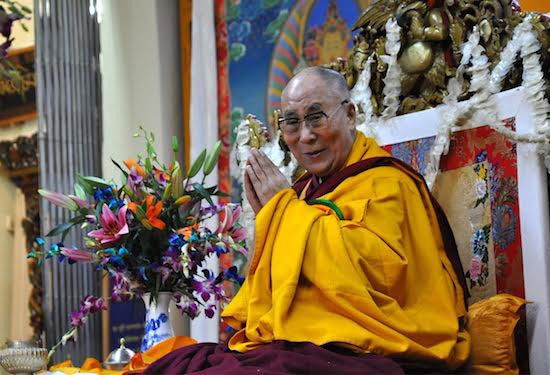Business
Donate cashless at Buddhist ceremony in January

Dharamsala, Dec 14: The Tibetan government-in-exile said on Wednesday it would accept cashless donations for the 'Kalachakra' (Wheel of Time) ceremony to be held in in Bodh Gaya in January.
The 34th 'Kalachakra' would see over 200,000 devotees from across the world arriving in Bihar to hear Tibetan spiritual leader the Dalai Lama.
In light of the cash crunch after the demonetisation drive by the Indian government, the organising committee announced options to make direct or online donations as offerings, an official statement said.
The committee made available a series of options -- bank transfers, cheque payments, credit/debit card transactions, as well as direct cash payments, to ease the difficulty of procuring hard cash, the Central Tibetan Administration (CTA) said.
It asked the devotees to strictly abide by the legal compliance regulation of the host country while making the donations.
The Kalachakra ceremony would be held in Bodh Gaya, the place where the Buddha is believed to have attained enlightenment, from January 3-14.
Organisers of the ceremony said the Kalachakra is held for world peace and for smooth flourishing of Tibetan Buddhism.
During the first three days of the Kalachakra, the Dalai Lama, along with the monks of Namgyal Monastery and senior Lamas, would conduct rituals to consecrate the venue.
On January 9, the Kalachakra ritual dance would be performed by the monks of Namgyal Monastery.
From January 10 to 13, the spiritual leader would confer the Kalachakra initiation, followed by a long-life empowerment and a ceremony of offering prayers for the long life of the Dalai Lama on January 14.
Since 1954, the Dalai Lama has given 33 Kalachakra initiations, including four times at Bodh Gaya (in 1974, 1985, 2003 and 2012).
The last Kalachakra was also held in Bodh Gaya in 2012 and drew over 200,000 devotees from across the world, including about 8,000-10,000 from Tibet, the CTA said.
The Dalai Lama has lived in India since fleeing his homeland in 1959. The Tibetan administration-in-exile is based in this northern Indian hill town. India is home to some 100,000 Tibetan exiles.

5 hours ago
'This is a long-term plan, a strong desire to return to the old life'; Usha Vance

5 hours ago
AAPI President Dr. Amit Chakrabarty Strengthens Community Bonds with Chapter Visits

6 hours ago
Indian envoy, US Congressman discuss shared priorities on defence and security cooperation, AI

6 hours ago
Indian American leaders urge deeper political engagement at Detroit dialogue panel

6 hours ago
US Congressman calls for deeper India–US ties, civic engagement

6 hours ago
Manhunt intensifies for Brown University shooter, campus on lockdown

6 hours ago
Two US soldiers, translator killed in ISIS attack in Syria; Trump vows ‘serious retaliation’

6 hours ago
US Air Force completes recovery operation of crashed MQ-9 drone

6 hours ago
At least two killed in shooting at Brown University in US Rhode Island

6 hours ago
CM Stalin to attend DMK youth wing’s regional conference in Tiruvannamalai today

6 hours ago
Polling underway for second phase of panchayat elections in Telangana

6 hours ago
PM Modi likely to celebrate Pongal with farmers during January TN visit

6 hours ago
Water storage in TN's Cauvery delta tanks increases as rain boosts water storage






















